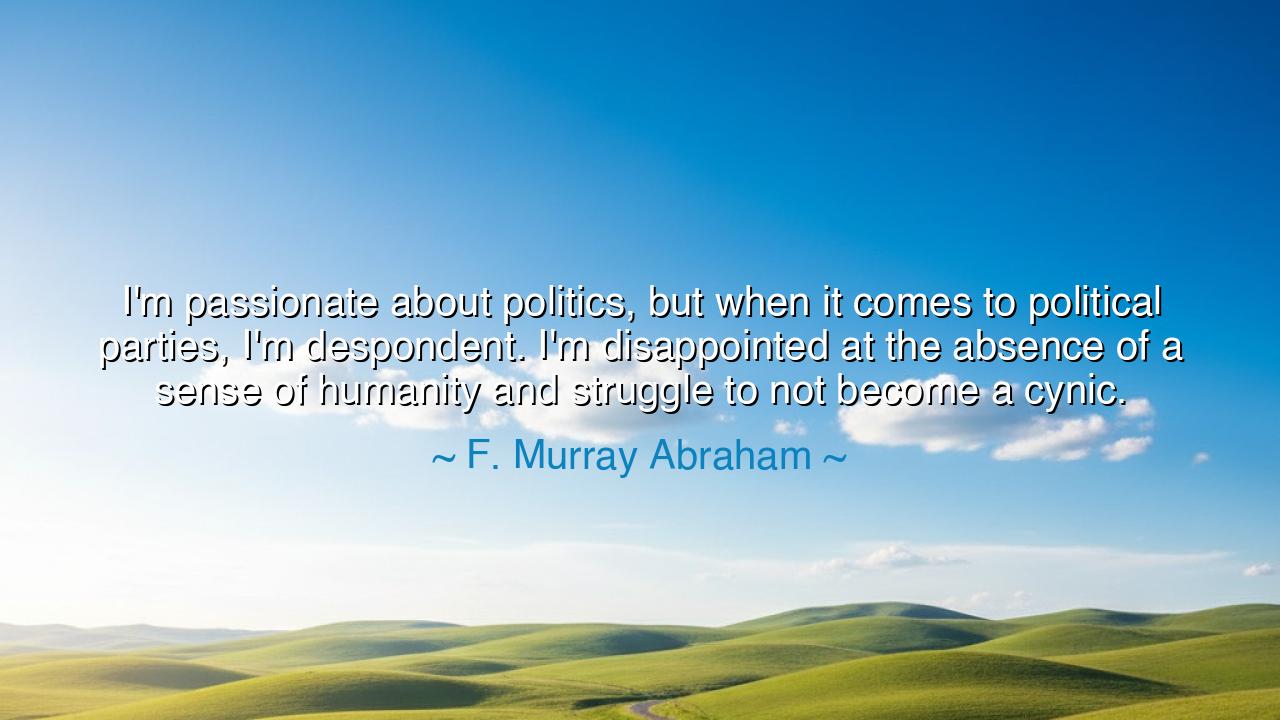
I'm passionate about politics, but when it comes to political
I'm passionate about politics, but when it comes to political parties, I'm despondent. I'm disappointed at the absence of a sense of humanity and struggle to not become a cynic.






F. Murray Abraham’s words—"I’m passionate about politics, but when it comes to political parties, I’m despondent. I’m disappointed at the absence of a sense of humanity and struggle to not become a cynic"—burn with the fire of a heart both hopeful and wounded. To be passionate about politics is to care for the fate of the people, to yearn for justice and order among the affairs of men. Yet that noble flame dims when it collides with the cold machinery of parties, where loyalty to faction often outweighs loyalty to truth.
The cry of despondency in his words reveals a timeless sorrow. For as long as men have gathered into factions, political parties have too often placed ambition above compassion, strategy above humanity. The disappointment Abraham names is not weakness, but a deep awareness of how far human institutions can fall from their sacred purpose: to serve. To feel such disappointment is to stand at the edge of cynicism, tempted to believe that all is corrupted beyond repair.
History shows us the truth of this lament. Consider the French Revolution: born in the fiery passion for liberty and equality, it soon fractured into warring factions—the Jacobins, the Girondins, and others. Each party, blinded by ambition and suspicion, turned against its rivals. The result was not unity, but terror, where guillotines silenced the voices of hope. The Revolution began with humanity’s cry for freedom, but the absence of compassion led to despair. Thus, the warning of Abraham’s words is made manifest in blood and history.
Yet his confession also carries strength. To struggle against cynicism is itself an act of courage, for the cynic abandons hope, while the passionate spirit refuses to yield. Abraham’s words remind us that disappointment need not destroy us—it can sharpen our vision, calling us to seek leaders and movements that restore humanity to the heart of governance. In this way, the battle against despair becomes a battle for the soul.
Let those who hear these words remember: politics without humanity is but an empty shell, and parties without compassion are but masks for power. The wise citizen must remain vigilant, passionate yet discerning, refusing to surrender to the poison of cynicism. For though the world may disappoint, the flame of integrity must not die.
And so the quote stands as a torch for future generations. It teaches that while men may grow weary of parties, they must never grow weary of humanity’s cause. Passion tempered by wisdom, and disappointment overcome by hope—these are the weapons by which the noble heart endures.






NPLe Na Phan
F. Murray Abraham’s frustration with political parties and his struggle to retain his passion for politics seems to reflect a broader sentiment of dissatisfaction. Is this a sign that political systems need a fundamental shift to restore human connection? How do we bring back a sense of humanity to politics without falling into the trap of cynicism? Can passionate people like Abraham find a path forward, or are they doomed to continue feeling disillusioned?
HYPham Hai Yen
Abraham’s struggle to avoid cynicism despite his passion for politics is a common challenge in today’s political climate. How do we keep the flame of hope alive when the very institutions we want to change seem so resistant to compassion and empathy? Is it even possible to engage with politics without becoming disillusioned, or is that part of the process? How can we create a system that honors humanity without sacrificing progress?
NTKien Le Nguyen Thanh
It’s disheartening to hear someone as passionate about politics as Abraham express despondency toward political parties. Does this reflect the larger trend of political apathy many people are feeling today? How do we remain optimistic about political change when it seems like the system is fundamentally broken? Can we maintain our passion for progress if we feel that humanity has been lost in the pursuit of political power?
TTTran Thi Thu
The disappointment in Abraham's quote is palpable, particularly when he speaks about the absence of humanity in politics. Are political parties inherently dehumanizing, or has the system simply become so polarized that it’s difficult to see any sense of compassion? Can politics ever return to a place where empathy is prioritized, or are we too far removed from that ideal? Is it possible to navigate this system without becoming cynical?
DTNguyen Duong Tung
Abraham's quote speaks to the inner conflict of wanting to believe in the political system while grappling with the reality of party-driven division. Is there hope for individuals who are passionate about politics but weary of the corruption and lack of genuine human connection? How can people like Abraham retain their passion for politics without losing their faith in the system? What does it take to bridge the gap between idealism and disillusionment in politics?